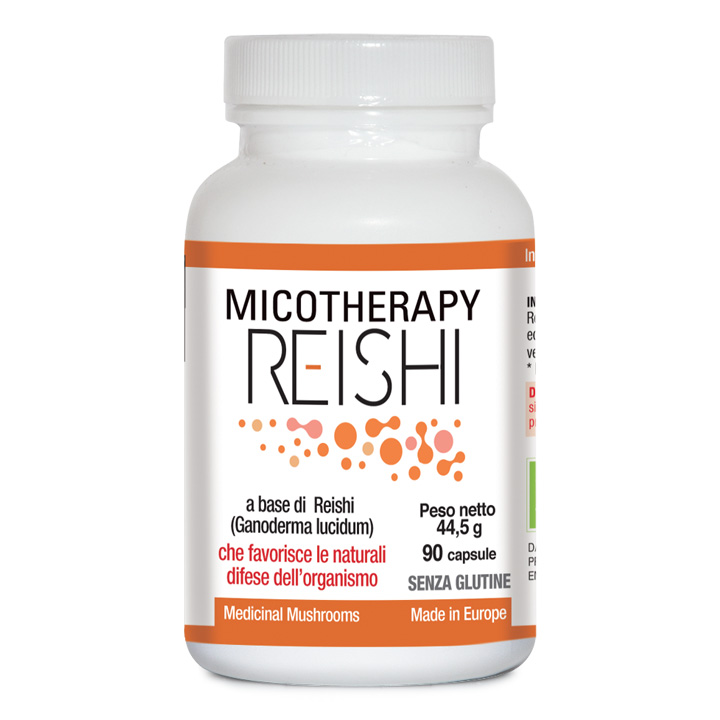
Optimizes stress management
Food supplement containing organically grown Reishi (Ganoderma lucidum) (IT BIO 006) – Made in Europe.
HEALTH BENEFITS:
Micotherapy Reishi is useful to reduce the changes in heart rhythm, the excessive production of cortisol, controlling systemic inflammation (inflammaging), to reduce the high perception of psychophysical stress, to reduce the alteration of blood pressure levels, spasmophilia, irritability and nervousness, to improve sleep and reduce mood disorders, and to support immune system deregulation.
PROPERTIES:
Also known as the ‘Mushroom of a Thousand Years’ and the ‘Mushroom of Immortality’, Reishi is traditionally regarded as a useful remedy for restoring balance to the body, consequently helping to improve resistance to disease. The most important molecules contained in the product are: polysaccharides, particularly beta-glucans, glycoproteins, triterpenes, sterols, amino acids, nucleosides, and vitamins and minerals, including Germanium in high quantities. The properties of Reishi allow it to regulate and strengthen the immune system. It also has a natural calming effect, helping to improve the ability to cope with psychological and physical stress.
Ingredients:
- Organically-grown Reishi (Ganoderma lucidum) whole mushroom pulverised and dry extract (titrated at 25% in polysaccharides)
Directions:
3 capsules per day, preferably away from meals
Pack:
packs containing 90 capsules
vegetable cellulose capsules
Notes:
Gluten free
Organic
No GMO
Play Sure-Doping Free certified product
Made in Europe
| AVERAGE CONTENT OF CHARACTERISING INGREDIENTS | PER DAILY DOSE (3 CAPSULES) |
| Reishi dry extract | 960 mg |
| Polysaccharide content | 240 mg |
| Reishi sporophorum | 240 mg |
BIBLIOGRAPHY:
- Zhou, Sh.; Gao, Y. The immunomodulating effects of Ganoderma lucidum (Curt.: Fr.) P. Karst. (Ling Zhi, reishi mushroom) (Aphyllo- phoromycetideae). Int. J. Med. Mushrooms 2002, 4 (1), 1–11
- Liu, G.T. Recent advances in research of pharmacology and clinical applications of Ganoderma P. Karst. species (Aphyllophoromycetideae) in China. Int. J. Med. Mushrooms 1999, 1 (1), 63–68
- Ko, H-H., H. Chi-Feng, J-P. Wang & C-N. Lin, 2008. “Antiinflammatory triterpenoids and steroids from Ganoderma lucidum and G. tsugae.” Phytochemistry Volume 69, Issue 1, January, Pages 234-239
- TV Lasukova, AG Arbuzov, LN Maslov, and VN Burkova. Ganoderma lucidum extract in cardiac diastolic dysfunction and irreversible cardiomyocytic damage in ischemia and reperfusion of the isolated heart. Patol Fiziol Eksp Ter, Jan 2008; (1): 22-5
- Zhang HN, Lin ZB (2004). Hypoglycemic effects of Ganoderma lucidum polysacchrides.Acta Pharmacol. 25 (2):191-195
- Tang W, Gao Y, Chen G, et al. A Randomized, Double-Blind and Placebo-Controlled Study of a Ganoderma lucidum Polysaccharide Extract in Neurasthenia. J Med Food. 2005;8:53-58
- R Zhang, S Xu, Y Cai, M Zhou, X Zuo and P Chan. Ganoderma lucidum Protects Dopaminergic Neuron Degeneration Through Inhibition of Microglial Activation. eCAM Advance Access published July 16, 2009
- ZY Zhou, YP Tang, J Xiang, P Wua, HM Jin, Z Wang, M Mori, and DF Cai. Neuroprotective effects of water-soluble Ganoderma lucidum polysaccharides on cerebral ischemic injury in rats. J Ethnopharmacol, August 19, 2010; 131(1): 154-64
- B Lakshmi, TA Ajith, N Jose, and KK Janardhanan Antimutagenic activity of methanolic extract of Ganoderma lucidum and its effect on hepatic damage caused by benzo[a]pyrene. J Ethnopharmacol, September 19, 2006; 107(2): 297-303
- Y Shi, J Sun, H He, H Guo, and S Zhang. Hepatoprotective effects of Ganoderma lucidum peptides against D-galactosamine-induced liver injury in mice. J Ethnopharmacol, May 22, 2008; 117(3): 415-9
- YQ Li and SF Wang Anti-hepatitis B activities of ganoderic acid from Ganoderma lucidum. Biotechnol Lett, June 1, 2006; 28(11): 837-41
- Zhou, Sh.; Gao, Y.; Chen, G.; Dai, X.; Ye, J.;Gao, H. A phase I=II study of a Ganoderma lucidum (Curt.: Fr.) P. Karst. (Ling Zhi, Reishi mushroom) extract in patients with chronic hepatitis B. Int. J. Med. Mushrooms 2002, 4 (4), 321–328
- Gao, Y.; Lan, J.; Dai, X.; Ye, J.; Zhou, Sh. A phase I/II study of Ling Zhi mushroom Ganoderma lucidum. (W. Curt.: Fr.) Lloyd (Aphyllophoromycetideae) extract in patients with type II diabetes mellitus. Int. J. Med. Mushrooms 2004, 6 (1)
- Dott. Martin Powell. The Use of Ganoderma lucidum (Reishi) in the Management of Histamine-Mediated Allergic Responses. Nutrition Practitioner October 2004 (www.nutprac.com)
- Sone Y, Okuda R, Wada N, Kishida E, Misaki A. Structures and antitumor activities of the polysaccharides isolated from fruiting body and the growing culture of mycelium of Ganoderma lucidum. Agric Biol Chem 1985;49:2641–53
- Mao T, van De Water J, Keen CL, et al. Two mushrooms, Grifola frondosa and Ganoderma lucidum, can stimulate cytokine gene expression and proliferation in human T lymphocytes. Int J Immunother 1999;15(1):13-22
- Chan WK, Cheung CC, Law HK, et al. Ganoderma lucidum polysaccharides can induce human monocytic leukemia cells into dendritic cells with immuno-stimulatory function. J Hematol Oncol. 2008;1(1):9
- Gao Y, Zhou S, Jiang W, et al. Effects of ganopoly (a Ganoderma lucidum polysaccharide extract) on the immune functions in advanced-stage cancer patients. Immunol Invest. Aug 2003;32(3):201-215
- HY Hsu, KF Hua, WC Wu, J Hsu, ST Weng, TL Lin, CY Liu, RS Hseu, and CT Huang. Reishi immuno-modulation protein induces interleukin-2 expression via protein kinase-dependent signaling pathways within human T cells. J Cell Physiol, Apr 2008; 215(1): 15-26
- Stanley G, Harvey K, Slivova V, Jiang J, Sliva D. Ganoderma lucidum suppresses angiogenesis through the inhibition of secretion of VEGF and TGF-_1 from prostate cancer cells. Biochem Biophys Res Commun 2005;330:46–52
- Free radical scavenging and immunomodulatory activities of Ganoderma lucidum polysaccharides derivatives.J Wang, Y Wang, X Liu, Y Yuan, and T Yue . Carbohydr Polym, January 2, 2013; 91(1): 33-8



